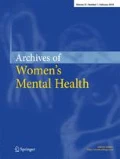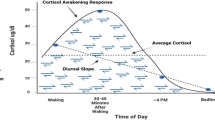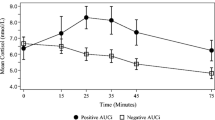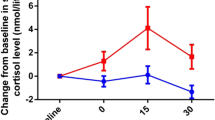Abstract
Anxiety and depression during pregnancy increase the risk for an adverse pregnancy outcome and neurodevelopmental problems in the child. The aim of this study was to investigate anxiety and depression in women with a medical disorder of pregnancy compared with control antenatal women, and any association with saliva cortisol. One hundred and twenty pregnant women (60 with a known medical disorder and 60 without, mean gestation 32 weeks) completed five self-rating questionnaires (Spielberger State and Trait Anxiety, Edinburgh Postnatal Depression Scale (EPDS), the Adult Wellbeing Scale and a Life Events Questionnaire). Diurnal saliva samples were obtained from 39 women with a medical disorder and 50 controls for cortisol analysis. The medical disorders group were significantly more anxious and depressed than the controls (mean (SD)) state anxiety 40.0 (11.5) vs. 31.6 (8.8), p = 0.00; trait anxiety 39.4 (9.5) vs. 35.2 (9.2), p = 0.02; adult wellbeing 15.9 (7.5) vs. 12.3 (7.5) p = 0.01; and EPDS 9.6 (5.4) vs. 5.9 (4.8), p = 0.00). There was no difference in the life events scores between the groups. The subgroup of women suffering from hyperemesis gravidarum had particularly high EPDS scores, (16.2 (3), n = 5, p = 0.00) compared with controls. There were no significant differences in the cortisol levels between the groups. Some women with a medical disorder during pregnancy showed considerably elevated levels of anxiety and depression. Health professionals need to be aware that these women need extra psychological support.

Similar content being viewed by others
References
Barbazanges A, Piazza PV, Le Moal M, Maccari S (1996) Maternal glucocorticoid secretion mediates long-term effects of prenatal stress. J Neurosci 16:3943–3949
Barker DJP (1998) Mothers, babies and health in later life. Churchill Livingston, Edinburgh
Bergman K, Sarkar P, O’Connor T, Modi N, Glover V (2007) Maternal stress during pregnancy predicts cognitive ability and fearfulness in infancy. J Am Acad Child Adolesc Psych 46(11):1454–1463
Buist A (2006) Perinatal depression assessment and management. Aust Fam Physician 35:670–673
Clarke AS, Whittwer DJ, Abbot DH, Schneider ML (1994) Long-term effects of prenatal stress on HPA axis in juvenile rhesus moneys. Dev Psychobiol 27:257–269
Cox JL, Holden JM, Sagovsky R (1987) Detection of postnatal depression. Development of the 10-item Edinburgh Postnatal Depression Scale. Brit J Psychiat 150:782–786
Crandon AJ (1979) Maternal anxiety and obstetric complications. J Psychosom Res 23:109
Grant KA, McMahon C, Austin MP (2008) Maternal anxiety during the transition to parenthood: a prospective study. J Affect Disord 108:101–111
Hedegaard M, Henriksen TB, Secher NJ, Hatch C, Sabroe S (1996) Do stressful life events affect duration of gestation and risk of preterm delivery? Epidemiology 7:3339–3345
Henry C, Kabbaj M, Simon H, Le Moal M, Maccari S (1994) Prenatal stress increases the hypothalamo-pituitary-adrenal axis response in young and adult rats. J Neuroendocrinol 6:341–345
Kurki T, Hiilesmaa V, Raitasalo R, Mattila H, Ylikorkala O (2000) Depression and anxiety in early pregnancy and risk for preeclampsia. Obstet Gynecol 95:487–490
Maccari S, Morley-Fletcher S (2007) Effects of prenatal restraint stress in the hypothalamus-pituitary-adrenal axis and related behavioural and neurobiological alterations. Psychoneuroendocrino 32:10–15
Murray D, Cox JL (1990) Screening for depression during pregnancy with the Edinburgh Depression Scale (EPDS). J Reprod Infant Psychol 8:99–100
Nakano Y, Oshima M, Sugiura-Ogasawara M, Aoki K, Kitamura T, Furukawa TA (2004) Psychosocial predictors of successful delivery after unexplained recurrent spontaneous abortions: a cohort study. Acta Psychiatr Scand 109:440–446
Obel C, Hedegaard M, Henriksen TB, Secher NJ, Olsen J, Levine S (2005) Stress and salivary cortisol during pregnancy. Psychoneuroendocrinology 30:647–656
Phillips DJW (2002) Endocrine programming and fetal origins of adult disease. Trends Endocrinology Met 13:363
Poulter NR, Chang CI, MacGregor AJ et al (1999) Association between birth weight and adult blood pressure in twins; historical cohort study. Brit Med J 319:1330–1333
Poursharif B, Korst LM, Fejzo MS, MacGibbon KW, Romero R, Goodwin TM (2008) The psychosocial burden of hyperemesis gravidarum. J Perinatol 28:176–181
Qiu C, Sanchez SE, Lam N, Garcia P, Williams MA (2007) Associations of depression and depressive symptoms with preeclampsia: results from a Peruvian case-control study. BMC Women Health 7:15–19
Rondo PH, Ferreira RF, Nogueira F, Riberiro MC, Lobert H, Artes R (2003) Maternal psychological stress and distress as predictors of low birth weight, prematurity, and intrauterine growth retardation. Eur J Clin Nutr 57:266–272
Rumbold AR, Crowther CA (2002) Women’s experiences of being screened for gestational diabetes mellitus. Aus N Z J Obstet Gynaecol 42(2):131–137
Sandman CA, Wadhwa PD, Chicz-DeMet A, Dunkel-Schetter C, Porto M (1997) Maternal stress, HPA activity, and fetal/infant outcome. Ann N Y Acad Sci 24:266–275
Sarkar P, Bergman K, Fisk NM, Glover V (2006) Maternal anxiety at amniocentesis and plasma cortisol. Prenat Diagn 26:505–509
Sikkema JM, Van BB, Franx A, Bruinse HW, de Roos R, Stroes ES, Van-Faassen EE (2001) Placental superoxide is increased in pre-eclampsia. Placenta 22:304–308
Snaith RP, Constantopoulos AA, Jardine MY, McGuffin P (1978) A clinical scale for the self-assessment of irritability. Brit J Psychiat 132:64–171
Spielberger CD (1983) Manual for the State Trait Anxiety Inventory (STAI). Consulting Psychologists Press, Palo Alto CA
Sugiura-Ogasawara M, Furukawara TA, Nakano Y, Hori S, Aoki K, Kitamura T (2002) Depression as a potential causal factor in subsequent miscarriage in recurrent spontaneous abortion. Hum Reprod 17:2580–2584
Swallow BL, Lindow SW, Masson EA, Hay DM (2004) Psychological health in early pregnancy: relationship with nausea and vomiting. J Obstet Gynaecol 24(1):28–32
Talge NM, Neal C, Glover V, Early stress Translational research and prevention science network: Fetal and neonatal experience on child and adolescent mental health (2007) Antenatal maternal stress and the long-term effects on child neurodevelopment: how and why? J Child Psychol Psychiatry 48:245–261
Thompson C, Syddal H, Rodin I, Osmond C, Barker DJP (2001) Birthweight and the risk of depressive disorder in late life. Brit J Psychiat 179:450–455
Vollebregt KC, van der Wal MF, Wolf H, Vrijkotte TG, Boer K, Bonsel GJ (2008) Is psychosocial stress in first ongoing pregnancies associated with pre-eclampsia and gestational hypertension? BJOG 115:607–615
Wadhwa PD, Garite TJ, Porto M, Glynn L, Chicz-DeMet A, Dunkel-Schetter C, Sandman CA (2004) Placental corticotrophin-releasing hormone (CRH), spontaneous preterm birth, and fetal growth restriction: a prospective investigation. Amer J Obst Gyn 191:1063–1069
Weinstock M, Matlina E, Maor GI, Rosen H, McEwen BS (1992) Prenatal stress selectively alters the reactivity of the hypothalamic pituitary adrenal system in the female rat. Brain Res 595:195–200
Author information
Authors and Affiliations
Corresponding author
Rights and permissions
About this article
Cite this article
King, N.M.A., Chambers, J., O’Donnell, K. et al. Anxiety, depression and saliva cortisol in women with a medical disorder during pregnancy. Arch Womens Ment Health 13, 339–345 (2010). https://doi.org/10.1007/s00737-009-0139-5
Received:
Accepted:
Published:
Issue Date:
DOI: https://doi.org/10.1007/s00737-009-0139-5




